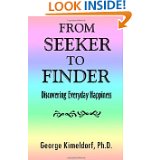From Seeker to Finder
Discovering Every Day Happiness
by George Kimeldorf
I’ve been alive 25,567 days. That is a long time. All I have ever wanted during that time was to be happy-nothing more.
I thought I knew what I needed to do to be happy, so I did all those things: I earned a Ph.D. in mathematics, married a wonderful woman, raised two lovely children, pursued a successful career as a mathematics professor, and became wealthy. Everything seemed fine. But the joy, satisfaction, and peace of mind I so desired continued to elude me.
At age 35, I began to realize that the “right” things would not get me what I wanted, so I actively sought happiness by doing workshops, reading self-help books, leading seminars, practicing self-hypnosis, and meditating. I became a seeker.
Only in the past few years did real transformation begin. I am no longer a seeker; I am a finder. Despite doubting in the past that I would ever succeed, I have found the happiness and peace of mind I had long sought.
I actually love life.
I love the world, and I especially love and accept myself. I have discovered that we can really love the world and all the people in it, despite the violence, hatred, crime, hypocrisy, greed, suffering, and starvation.
I am celebrating my 70th birthday as I write the first pages of this book. During this 70-year journey, I have discovered many things. To my utter amazement, I found that learning to be happy is not mystical, mysterious, or magical . Happiness is an ordinary skill that anybody can learn and master through practice, like driving a car or playing a violin. And like driving a car or playing the violin, happiness is an experiential skill which cannot be learned from reading books.
If happiness cannot be taught in a book, why am I writing this? The first purpose of this book is to tell you what does not work. In my quest for happiness, I pursued many fruitless paths. What if I had achieved happiness earlier in life, rather than having spent decades following roads leading nowhere? Had I read a book such as this, I might have avoided some of these pitfalls and shortened some of these detours. By sharing my experience, I hope to spare you years of looking in the wrong places.
Most people spend their entire lifetimes seeking happiness in places where, at best, it is only temporarily experienced. Their parents, teachers, and religious leaders falsely promised them as children that hard work, financial success, acquisition of goods, and approval from others will make them happy. Our culture spreads these illusory expectations through movies, books, TV, and advertising. When people achieve these goals hoping to be happy and then realize that they are not in fact happy, their unfulfilled expectations lead to disappointment, dissatisfaction, disillusionment, and discouragement. To make matters worse, they often blame themselves for this perceived failure, leading to feelings of powerlessness and despair.
Other people, having read books or attended seminars, are seekers. They know that they cannot achieve happiness through financial success, acquisition of goods, or approval of others. They know that happiness results from experiencing gratitude, acceptance, self-love, and forgiveness. They have learned that the path to happiness is through awareness of their thoughts, doubting their beliefs, changing their points of view, and expressing unconditional love. Yet they remain seekers. Although they know what to do to become happy, the true joy, peace of mind, satisfaction, and contentment which they fervently seek continues to elude them.
I have met dozens of such seekers, who are unwittingly driving with their left foot on the brake pedal. Until they discover and confront how they are holding themselves back, they will forever remain seekers. In later chapters, I will describe my good fortune in finding teachers who not only made me aware of how I was pressing that pedal, but also assured me that it was safe to release my foot from the brake.
The second reason for writing this book is to tell you about the path by which I have achieved my current state of happiness, joy, and peace of mind. Perhaps it will inspire you to pursue a similar goal. Will my path work for you? I do not know. I know that it has worked for me, as well as for many other people. I also know others who, after learning about this path, have decided not to pursue it. I respect their decision. It is not for everybody.
When you watch young children, have you noticed their obvious excitement in being alive, their natural curiosity, their joy, their spontaneity? Two minutes after being hurt, they are laughing and ready to play. We were all once young children. What happened to our spark, spirit, and spunk? Can this joy of life be revived? Why do so many of us instead experience cynicism, resignation, and discontent? Must we take life so seriously? As you read, I encourage you to think about these questions and how they relate to your own life.
My last reason for this book is that I enjoy writing it. May you derive as much joy and inspiration from reading it as I do from writing it.
Buy it today.

–
–

